










This month and into 2023, Delano will publish longer cartes blanches from the contributors in this issue. Read them online, where you can also sign up for our daily noon briefing and finance newsletter.
www.delano.lu
For those who might have missed it, Delano recently announced an ambitious development plan for 2023. Going into the new year, our magazine and website will have a more targeted focus on the grand duchy’s financial centre, while still keeping readers informed on business, technology, politics, diplomacy, culture, plus helpful tips for the international community.
Indeed, this special Forecast issue kicks off with 10 experts from the financial centre sharing their perspectives on the year ahead. Similarly, we asked specialists for our Business & Economy, Tech & Innovation, Politics, Culture & Lifestyle sections to weigh in with their forecasts for 2023 and beyond. Add to that the seven industry professionals contributing to our special business report on holidays and travel, which means this edition includes analy ses and prognoses from nearly 60 Luxembourg leaders.
To what extent will the financial centre help buffer inflation ary shocks and a possible recession? How are companies acquir ing and retaining talent? What can be done within the grand duchy to attract top talent, given such challenges like housing? Many of these themes recur, so we’ve included the top five megatrends gleaned from our experts on page 50.
We’re also excited to introduce this issue’s cover star, Allen & Overy junior associate Justine Yansenne. She and fellow team members--Lucie Lavergne, Dimitrios Karagiannis and Silvia Buliscakova--recently came in second place in the Young European Lawyers Contest, where they successfully defended a case before a jury of EU judges, private practice lawyers and academics. Yansenne bagged a top award as best speaker, and here she eloquently addresses the future of mergers and acquisitions, capital markets, investments and more.
As many experts fairly told us, there’s no crystal ball… Most of us one year ago never would have predicted a nearly year-long war in Ukraine, the ensuing energy crisis, snap leadership changes, etc. But the participants in this issue have genuinely taken the time to reflect on what could be in store for 2023 so we can all be as best prepared as possible.
Editor-in-chief, Delano magazine NATALIE A. GERHARDSTEIN







Justine Yansenne, a junior associate at Allen & Overy Luxembourg, was part of a team that placed second in the Young European Lawyers Contest, where she was also awarded the prize for best speaker.
From your perspective, what would be the impact of the Corporate Sustainability Reporting Directive (CSRD) on your corporate practice in Luxembourg ?
First, I think it is important to note that this piece of legislation, like the SFDR, is part of the wider growth strategy of the EU when it comes to net zero tran sition by 2050, outlined in the European Green Deal.
I think that it is crucial for all players, but especially young lawyers, to be aware of the developments in the so-called ESG sphere. Climate change mitigation has moved up the priority ladder as a policy goal. For instance, the entry into force of the Sustainable Finance Disclosure Regulation has been a unique opportun ity for our investment funds team here at Allen & Overy in Luxembourg to pos ition themselves as experts in that area and to advise assets managers on how to comply with the additional transparency and disclosure requirements under the regulation with regards to the integra tion of sustainability risks.
The CSRD includes an extensive list on the exact nature of information to be disclosed. For example, management reports of in-scope companies will need to include a transition plan, outlining a set of actions and ‘time-bound targets’ aiming to ensure that their business model and strategy are compatible with the European Climate Law objectives. The report should also indicate whether such a transition plan is based on conclusive scientific evidence and contain updates on progress made in relation to these set targets. Reports will also need to include information on the due diligence process implemented by the company concern ing sustainability matters.
Looking at the Corporate Sustainabil ity Reporting Directive (CSRD), it is likely to have an impact for our clients and, as a result, for law firms in Luxembourg (although not necessarily for corporate practices). In brief, the CSRD will expand the scope of the existing Non-Financial Reporting Directive (NFRD) to include all ‘large’ EU companies (whether listed or not) and all EU and non-EU SMEs with securities listed on an EU-regulated market, with the exception of certain micro-undertakings and subsidiaries if their non-EU parent company is subject to equivalent obligations. This effectively means that Luxembourg holding com panies that are listed entities in Luxem bourg or elsewhere in Europe might fall within the scope of CSRD, unless they qualify as a micro- undertaking or have a non-EU parent company subject to equivalent obligations.
In other words, in-scope Luxembourg companies will have to develop, among other things, a transition plan, if possi ble backed by tangible scientific evi dence that includes clear targets. They will also have to deliberately work towards the targets they have set for themselves and possibly develop relevant due dili gence processes linked with ESG mat ters. This will have to happen relatively fast as, in its current form, the CSRD is expected to enter into force as of 2024 after transposition into national law. I think this creates a new opportunity for a whole range of service providers to develop a specific expertise to assist these companies in assessing what their transition plan and due diligence pro cesses should be and how to best imple ment them.
Interview NATALIE A. GERHARDSTEIN Photo GUY WOLFFOne of the main practical consequences for in-scope entities will be the obliga tion to include certain information on environmental, social and human rights and governance factors into their man agement reports. In particular, these entities will need to disclose what the impact of their activities is on such fac tors, and how they affect their develop ment, performance and position.
For lawyers, the key angle will be to help clients evaluate whether they fall within the scope of CSRD, as well as what are the practical and concrete impli cations on their business. In corporate law, it will mean, for instance, making sure that strategic decisions made by corporate bodies take into consideration relevant environmental, social and human rights and governance factors, and are properly documented as such. I do not expect a significant impact on the dayto-day work of corporate lawyers, but it is an opportunity to develop a set of skills to answer a demand that will most likely increase in the upcoming years. At Allen & Overy, we put in place an ESG group two years ago, targeted at deliv ering a cross-practice one-stop shop for clients seeking to evaluate the impacts of ESG-related regulations on their com panies and operations.
Earlier this quarter, S&P Global pre dicted that a mergers and acquisitions rebound in 2023 would be unlikely due to the increased costs of financing. Others predict that, at least for tech companies, M&A deals will increase in volume. How do you see the trend for Luxembourg for the year ahead ?
That’s a really good question. Through the lenses of a young lawyer, there will be some changes in the M&A landscape. That is fact… Now, if we look at M&A globally, the trend is towards a decrease, and we’ve witnessed here there are slightly fewer international M&A deals. Firstly, as you said, due to the increase cost of lending and debt financing. Secondly, asset valuation is way more difficult because there is a lot of volatility in the market.
But here in Luxembourg, we’ve seen some clients are really innovative in find ing solutions to tackle the debt financing problem. This is proof that the market is reactive, quick on its feet. So, in that sense, I don’t see a real impact yet because they can still make deals via these alter native sources of financing while still maintaining a good internal rate of return.
Looking at domestic activity, it’s still going strong. Should a crisis actually hit, it will mean that some assets on the market will most likely end up being cheaper. This will provide opportunities for those that have the means to buy such assets. So there might be a pickup at some point. From what I’ve read, as well as from discussions
with my partners, we will see, I think, a shift towards a buyer-friendly market.
Then there is all the work stream that will inevitably develop as a result of a potential storm happening. By this I mean restructuring work that will pick up as well, if there should be a recession head ing our way. So I think it needs to be nuanced, but if anybody benefits from a crisis, most of the time it’s lawyers.
in Luxembourg ?
Legal tech is a great tool, and every young lawyer should not only know that such tools exist but also be familiar with them and know how to use them on a daily basis. I think upcoming developments in the legal tech sector are something to look forward to as lawyers. If used well, it can contribute to making our day-today work easier and more efficient. I am also convinced that, on a higher level, being up to date with developments in that area is key for law firms to remain competitive in the market. At Allen & Overy, we are well aware of this and we are grateful for our head of risk and knowl edge tech, Audrey Scarpa, who helps us make sure that we stay on top of any new developments. In addition, we have set up the Fuse learning lab that allows us to be close to best-in-class technologies and use them to deliver efficient advice where and when appropriate.
This reminds me of a debate we had in class during my master of corporate law at the University of Cambridge. The focus of the class was the future of the lawyer profession and legal markets as a whole. That debate was twofold: eval uating whether legal tech would ‘steal our jobs’ and whether Big Four account ing firms would take an increasing share of the legal market away from law firms. While I will leave the second point for another day, the conclusion was that legal tech would not ‘steal’ our jobs. On the contrary, it allows for our daily practice to become more bespoke. Provided we use it well, legal tech will allow lawyers to allocate their most valuable resource, their time and energy, to where they have the highest added value.
Do you anticipate a normal or rather depressed market for 2023? Are you confident vis-à-vis the future of your practice in this context ?
This is the 100mn-dollar question, isn’t it? Unfortunately, I do not have a crystal ball, but I read the financial press and will try to answer from the perspective of a young lawyer.
Looking at the global economy, I think a lot of indicators, such as rising infla tion and the resulting increases of inter est rates, point towards a slowdown (which has already started). The covid crisis, energy crisis and war in Ukraine obvi ously already had an adverse impact on
the macroeconomic situation. Now, whether this slowdown will continue and for how long remains to be seen and is likely to be different from sector to sec tor. I am convinced that Luxembourg is well positioned to weather the storm. The same is certainly true for our corpo rate practice.
A first reason is that, despite what is going on in the global market, we observe that the Luxembourg domestic M&A market remains relatively active. This is currently keeping our team very busy. Other opportunities are arising, in par ticular in restructuring deals, which are equally relevant for our practice. A sec ond reason is that, in my opinion, the economy of Luxembourg is well hedged against any crisis. Luxembourg has man aged to diversify its economy since the implementation of the Ucits directive back in the days. Certain new sectors have thrived recently, such as the space industry, logistics and tech more broadly. Some sectors might, of course, be more impacted than others should the slow down continue over a long period of time, but this diversification should allow Lux embourg’s economy to stay the course. Finally, Luxembourg benefits from a dynamic regulatory environment that allows the country to constantly attract new sectors of activities, thanks to its competitiveness. We observed this some time ago with payment service providers but also with fintech more broadly.
What do you anticipate will be the main challenges for young lawyers willing to start a career in Luxem bourg in 2023 ?
The main challenges will remain first to choose their specialty and second to choose where to start their career in terms of type of firm and country. One cannot overemphasise the importance of intern ships to witness hands-on the concrete application of a given area of law in prac tice. Practice at a law firm differs widely from university, and this might or might not suit you. Several factors should play a role when choosing your firm and juris diction, such as job certainty, training, work-life balance and, last but not least, the atmosphere.
Luxembourg as a jurisdiction is in constant evolution, and there will always be opportunities for motivated, young talents ready to seize them. I would give
Luxembourg a triple A, akin to its credit rating. Job certainty is somehow a given. Luxembourg is also really interesting for young talents as they can benefit from the presence and related standard of training of certain international law firms while also enjoying the advantages of a smaller-sized jurisdiction. In other words, while their training will, of course, be linked to a particular area of law, they will not be obliged to overspecialise either. For instance, in the corporate department of Allen & Overy, junior lawyers have the opportunity to work on a wide variety of files ranging from IPOs to pure M&A and PE acquisitions and advisory work. In my opinion, this is the best of both worlds and allows to build strong foundations to develop one’s career as a lawyer.
Finally, in terms of work-life balance, the country offers the opportunity to work on international transactions while being able to be in the countryside in a few minutes by car from the city cen tre. From my own experience and tes timonies of some of my friends working in other jurisdictions, I would say the atmosphere in Luxembourg is quite unique when it comes to work-life bal ance. For instance, at Allen & Overy, we have fitness and yoga classes avail able five times a week and everybody, across all seniority levels, is encouraged to attend. I play rugby and have train ing twice a week, next to being a law yer at Allen & Overy, and with a bit of organisation it works perfectly. We also have an active pro-bono committee, of which I am a proud member.
“SHOULD A CRISIS ACTUALLY
HIT, IT WILL MEAN THAT SOME ASSETS ON THE MARKET WILL MOST LIKELY END UP BEING CHEAPER. THIS WILL PROVIDE OPPORTUNITIES FOR THOSE THAT HAVE THE MEANS TO BUY SUCH ASSETS”by PAPERJAM + DELANO and LUXEMBOURG FOR FINANCE
Driver of the Luxembourg economy, the financial centre has developed since the 1950s to become a leading European platform for international financial institutions:
— 123 international banks from 26 countries
— 57% global market share in cross-border investment
funds (PwC Global Fund Distribution 2022)
— International portability and a unique level of protection in life insurance
— European leader in international securities listings (39,000 + listed and tradable securities)
— Largest market share
P aperjam + Delano and Luxem bourg for Finance are delighted to announce their first Finance Awards – another chance for us to give recognition to those in the finance industry who continued to show excellence and outstand ing expertise during the year.
This awards ceremony also rewards those who were instrumental in the creation of the financial centre, its development and the structuring of its products, and those who represent it internationally.
of listed green bonds in the world
— A comprehensive fintech ecosystem and strong start-up support
— EU continental hub for 7 Chinese banks
— 1st Islamic fund centre in the EU, 4th in the world
In total, over 150 recog nised and influential experts across Luxembourg’s finance sector will be nominated in one of the seven categories and shortlisted by a panel of peer-to-peer, high-profile experts.
The finance industry is a key driver of Luxembourg’s economy. Our Finance Awards are dedicated to supporting and recognising talented and dedicated individuals.
Skyrocketing mortgages, material and labour costs are all hitting real estate, but interest rates are critical, according to vice president of LuxReal, the Real Estate Association of Luxembourg Emmanuelle Ramponi.

“If central banks reduce rates in 2023, we may see a cautious recovery,” she said. In the meantime, a short-term price adjustment is inevitable. “We have seen discounts already,” said Ramponi. “Now, with limited visibility on exit prices, interest rates and other discounted cash flow parametres, investment managers are limiting new acquisitions and focusing on portfolio review.”

In the short term, Ramponi expects distressed sales from actors in need of liquidity. She also points out that institutional investor portfolio exposure to real estate is mechanically increasing as the value of global equity markets fall, prompting a reexamination of their strategic asset allocation and further sales.
Yet some asset classes are more resilient than others. “Industrial assets have consistently outperformed--particularly, logistics assets fared well with the covid-19 online shopping boost.” Ramponi also cites the “green premium” for portfolios that comply with decarbonisation: “Investment managers who have embedded more ESG or tech credentials will protect their margins and profitability.”
Luxembourg’s finance industry is well enough capitalised to navigate turbulent times, but Guy Hoffmann says Luxembourg must manage finance sector growth in the coming years. “2023 will be a challenging year,” he said. “Inflation and interest rates will increase loan defaults, and uncertainty makes banks unwilling to invest.”
However, Hoffmann is more concerned for beyond 2023. “It’s the re putation we have abroad and the country at large,” he said. “If Luxembourg fails to continue attracting talent and nurture innovation, it runs the very real risk of losing credibility in the outside world.”
And this concerns everyone, he noted, as everything from social security to the health of the pension system relies on a thriving financial sector economy.
“Housing supply and an overly strict labour law need to be urgently addressed. If you can’t, the people here to develop your business companies will not develop anymore in Luxem bourg.” Hoffmann acknowledges that Luxembourg has the lowest volume of non-performing loans in the EU and has shown in the past that the economy is resilient. The challenge is for political leaders to take unpopular measures. “We’re a small ecosystem. We’ve shown with covid and the Ukraine refugee response that if the right people make decisions, we can get things moving.”
“We’re a small ecosystem… if the right people make decisions, we can get things moving”
Guy HoffmannPhotos Romain Gamba, Mike Zenairi, Maric Zorman Nicolas Mackel CEO, Luxembourg for Finance
For CEO of Luxembourg for Finance
Nicolas Mackel, Luxembourg can still maintain its role as the international jurisdiction of choice for European alternative investments in 2023 and even provide certainty in sustainable finance.
“Priority number one lies with sustainable finance,” said Mackel. “That’s huge.” Luxembourg can be a centre of excellence as a regulatory and compliance nerve centre, he argued, as long as it can work hard in 2023 and beyond to digest and implement the whole EU regulatory framework. “We need to check whether a fund is doing what it says on the tin.”
For alternative investments, he acknowledges that the volatile macroeconomic environment will slow deal flow. “There will be a higher interest rate on the debt raised. That will have an impact on deal volume in private equity and real estate which will affect the volume of assets under management in Luxembourg alternative funds.”

However, Mackel views this as a dampener on growth rather than a diminishment of Luxembourg’s role. “People still believe in Europe,” said Mackel, “and at times of inflation, people want yield.”
One of the challenges for 2023 will be talent. “We need to provide an excellent workforce by bringing people in from outside and massively investing in the training of people.”
With a large amount of private equity money chasing a comparatively smaller number of deals, Olaf Kordes says PE houses that offer companies something different will beat the competition. “Visibility is close to zero and we’re working with various business cases,” said Kordes. “That’s why it’s important to take a long-term view.”

Luxempart, which invests for the most part in the DACH region plus France, is able to take long-term investments, sometimes as a minority shareholder, thanks to investing from balance sheet. This puts it in a better position than the traditional PE model locked in its cycle of fundraising and divesting.
“We have 8-10 years in front of us, whereas [traditional] PE has a shorter investment horizon,” Kordes clarified.
And although interest rates are high, leverage in PE is lower than it was in the last crisis of 2008-2009. “Businesses taking a long-term view are capable of paying for [the higher interest rates],” said Kordes.
Meanwhile, uncertainty still brings big opportunities. “You can use the time to work on your portfolio com panies,” he added. For new deals, the necessary market shrinking at a time of high inflation has bestowed a Darwinian advantage on the best. “The deals that get done are top-notch assets.”
Olaf Kordes Managing director, LuxempartThe fundamental strengths of the Luxembourg private assets industry remain intact, said the Association of the Luxembourg Fund Industry’s director general Camille Thommes--despite a challenging economic environment.
“The double-digit growth rates registered over the recent past, both in assets under management and number of private asset vehicles, are a testimony of Luxembourg’s international success,” said Thommes.
For this, he credits a number of efforts: “The modernisation of our legal toolkit with the creation of the Reserved Alternative Investment Fund, as well as the introduction of the limited partnership structure were determining factors in the strong progress of this segment in Luxembourg.”

He also believes Alfi and its working groups have done much to make Luxembourg attractive. “Alfi is at the forefront of regulatory developments in the private assets space such as the review of AIFMD and ELTIF 2.0. The debates around expanding the access of private assets to retail investors are gaining ground as regulations start to loosen and governments recognise the need for capital sourced from the private sector.”
For 2023, Thommes is optimistic. “The democratisation of private assets represents a growth opportunity for Luxembourg in the

After a volatile 2022, Lionel De Broux says investor demand for yieldproducing assets remains, but, he cautions, they must be part of a diversified portfolio.
“It’s not like investors are so burnt [from 2022] that they want to take out their money into cash. Instead, we have seen an appetite from investors to consider different asset classes.”
De Broux explains that the democratisation of the private markets by regulation such as Eltif makes it easier for retail investors to enter private debt and private equity funds normally reserved for large-ticket institutional investors. The yield on these alternative assets is attractive for private banking clients, but he warns that liquidity is still a barrier.
“Even if a solution is provided for the liquidity of alternative assets for retail clients, we must still consider these assets as long term, and more liquid investments should also be included in the portfolio for diversification purposes,” he said.
In terms of risk appetite, he is seeing robust curiosity from clients. “Investors continue to be exposed and to ask questions about what to expect for 2023 following the very sharp increase in interest rates in 2022. Options to stay invested and generate additional returns are still there. We have to be aware of how exceptional this time is.”
Silke Bernard Partner, LinklatersWith two long-awaited regulatory frameworks--the AIFMD and Eltif-close to agreement at the end of 2022, Silke Bernard, partner at Linklaters, is optimistic about the future of Luxembourg in alternative investment.
However, never one to rest on her laurels, she believes the next big regulatory opportunity is ESG.
“To me the critical point is to have clear interpretation and communication,” she said. “What we want to avoid is uncertainty on ESG topics--there are too many positions, too many FAQs, briefings and guidance that diverge and sometimes even contradict each other.” It is important to address greenwashing. “We clearly need a reliable definition of greenwashing,” said Bernard. “With the new ESG landscape there are new markets opening up, hydrogen funds are developing, we see more energy transition funds, we see opportunities in blended finance--totally new markets that will benefit from a clear and certain ESG regime.” According to Bernard, this can happen in 2023.
“If Luxembourg provides legal certainty and if it can find an aligned interpretation on concepts, it could really make itself a centre of expertise for the structuring and domiciliation of ESG funds in 2023.” She likens it to dust in the air. “We need the dust to settle. When there’s too much dust, you can’t see anything.”

“We have to be aware of how exceptional this time is” Lionel De BrouxGuy Wolff, Romain Gamba, Bob Voirgard
On the lookout for trends?

Embrace your investment style, with the security of a bank.
swissquote.lu
All investments carry a degree of risk.
Swissquote Bank Europe SA – RCS B78729. Bank licensed in Luxembourg under supervision of the CSSF.
2023
Ananda KautzThe coming year is a special one in digitalisation, according to the Luxembourg Bankers’ Association’s head of innovation, digital and payments Ananda Kautz. So what can we expect?
“It’s all about payments in 2023. Instant payments and the European Payment Initiative will bring innovations to the market, while important steps will be taken on stablecoins and a possible digital euro. The ISO20022 single standard migration completes the picture for end-to-end automation in payments.”
A series of frameworks and legislation will make 2023 a big year of preparation for the Luxembourg banks. “The Digital regulatory agenda by the European Commission will be dense in 2023: open finance, data act, artificial intelligence act, digital ID, in addition to Markets in Crypto-Assets and the Digital Operational Resilience Act. In this context, ABBL is looking for opportunities to collaborate with fintech,” said Kautz. Security for customers and financial market stability will be of extreme importance. “The Digital Operational Resilience Act will put in place safeguards. Meanwhile, considerations over cybersecurity, access to data, and agile infrastructure like the cloud will be at the forefront of our members’ priorities. All digital teams are busy!”
“It’s going to be a tough year,” notes Nazir Zubairi, CEO of the Luxembourg House of Financial Technology. “Financial institutions’ profit margins are low while compliance costs rise. I’m not sure which way this is going to go.”
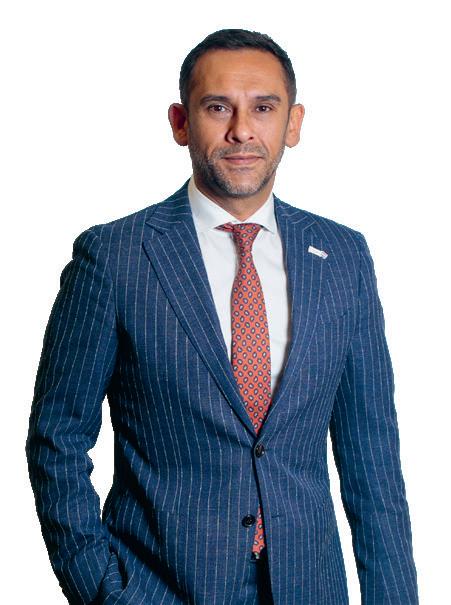
In a gloomy scenario, squeezed margins could shrink capital expenditure. However, Zubairi is cautiously optimistic about what this might mean for Luxembourg fintechs. “Part of the solution is investing in back-office technology that drives down costs. Fintechs in Luxembourg could be stable as they focus on regulatory technology and solutions that fit with the environment of Luxembourg.”
The same opportunity could apply to sustainable finance. “Data and regulatory uncertainty, ESG concerns, banks and funds. Technology is one of the only ways to do this in a productive manner.” Progress, however, will slow in distributed ledger technology. “Why? Because DLT really does require significant investment and change in infrastructure.”
Wage indexation and talent shortages will be one of Luxembourg’s biggest near-term challenges. “A minimum rise of 7.7% is a big hit for businesses in financial services, where salaries are the largest cost component.” And regarding talent, Zubairi notes that “talent shortages are everywhere.” However, he concedes “the cost of living in Luxembourg is a big drawback.”
The year 2022 was pivotal for ESG, according to Marie Niemczyk, because regulation has provided a concrete view on what is and is not a sustainable investment product. This clarity will allow more ESG criteria to be integrated into investment portfolios in 2023, as well as new themes like biodiversity.
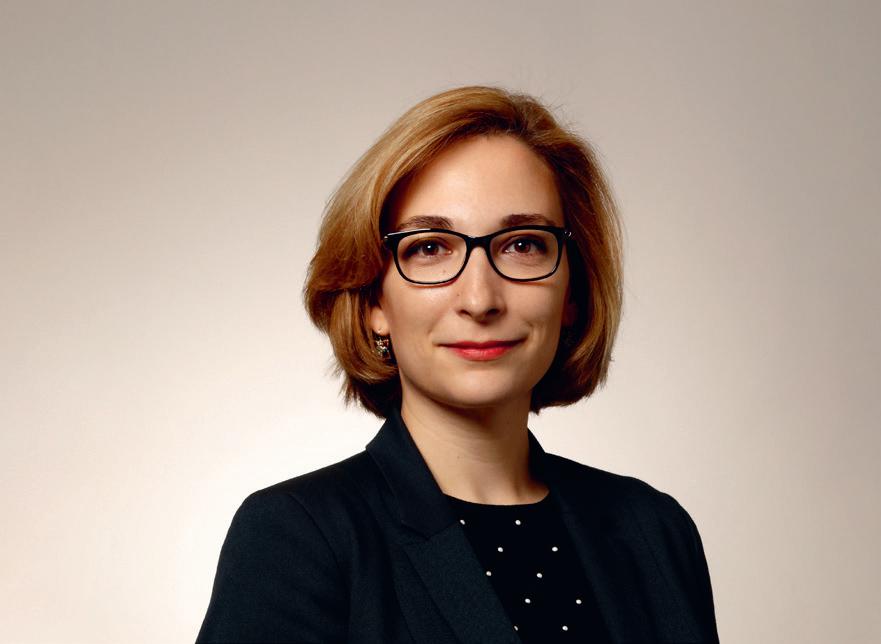

However, ESG can vary by asset class. “Insurance funds have taken an active interest because the millennial generation is a significant portion of their customer base.” Equities and fixed income have also been active as it was in these public markets that ESG first took hold. However, private assets can take longer. “Investors first entered private assets for yield, so the financial concern was paramount,” she explained.
A convergence is taking place around article 8 funds--those that promote ESG characteristics--with some downgrades from 9--those with a specific ESG objective. “As an industry, we can be comfortable with that convergence as long as, in addition to the article, we give investors full insight into our methodology,” said Niemczyk.
The challenge in 2023 is finding better data and a common approach. “Biodiversity will be a big topic in 2023. However, it’s difficult to quantify. We anticipate different models put forward by different players for biodiversity in 2023.”
Nasir Zubairi CEO, Luxembourg House of Financial Technology FINTECHS
“Wage indexation and talent will be Luxembourg’s biggest challenges”
Nasir ZubairiPhotos Vio Dudau, Matic Zorman, Candriam
Leo, the energy provider of the capital Serviceline 8006-4848 • www.leoenergy.lu

























































































































































































































































Let’s save energy while preserving moments of sharing As the year comes to an end, let’s keep saving energy and draw on the human warmth of our loved ones.Harles Manager, Alavita


The retail market in Europe in general, but also in Luxembourg, is definitely driven by two contradicting trends.
On the one hand, inflation means that people have less money available at the end of the month and must choose where to spend it. However, during the covid lockdown people were compelled to stay at home and do their own cooking. The retail food sector has, in this sense, benefited from the pandemic. 2020 and 2021 were extraordinary years.
On the other hand, as people were restricted from travelling and shopping for certain goods during these difficult times, we now see an increase in traffic in shops. Clients are enjoying the shopping experience. They are looking for human contact. City centres are again full of people enjoying a walk, having a drink and visiting shops.
A side effect is that shopping on the internet and delivery services, which were very much in demand during the crisis, have decreased again, even though they will certainly remain higher compared to pre-covid times.
We are confident that the organic food sector, and the trend to buy regional products, will grow. Consu mers have become more conscious of food quality, and the impact on their health and the environment. We have just opened a new shop at the Topaze shopping centre in Mersch and are definitely considering other opportu-

Logistics, transport and warehousing are priority sectors of Luxembourg’s diversification, accounting for 28,800 employees and 6.2% of GDP. However, Luxembourg needs to excel with effi ciency and quality. One way to create value is by reducing inefficiencies and costs with leaner processes via digi talisation. Logistics service providers and customers should be increasingly looking to replace paper documents with digital counterparts. The legal framework exists, but the forerunners are struggling due to a lack of industry standards and customer acceptance.
Fluctuating energy costs are im pacting logistics activities and drive another trend: sustainable logistics and alternative fuels. Diesel engines can be more sustainable by using expensive hydrotreated vegetable oil, but in the long run, the sector is looking at (green) hydrogen alternatives to electric trucks to reduce carbon emissions. Currently, hydrogen trucks and their fuel are too expensive without subsidies, and only prototype projects exist in Europe.
In order to achieve a sizeable fleet replacement and a solid alternative energy network, the C4L calls for public support for investments into the energy transition. In Luxembourg, a first hy drogen fuel station will be ready around the beginning of 2023 but additional platforms in the Greater Region will be needed to kickstart the movement.
“Luxembourg needs to excel with efficiency and quality”
Malik ZenitiPhotos Romain Gamba, Guy Wolff, JLL Luxembourg, Deloitte Luxembourg
We have good fundamentals on our markets, even if the macroeconomic situation is not so good. In Luxembourg, we still have strong parameters that give us a bit of flexibility. I cannot know what the macroeconomic situation will be next year. Some economists are talking about a recession. In the past, Luxembourg has always been resilient in these situations compared to other countries. For commercial real estate on the central markets--basically Luxembourg City--we’re quite confident that it will be fine because those districts have a low vacancy rate. We’ll be able to balance between demand and offer. At the same time, this year we saw an increase in the rents, especially in the central district. Occupiers are trying to change their organisation, to move to a hybrid model with flexibility and services…
There are many challenges on the occupier side, e.g., talent attraction and retention, sustainability. For the landlord or investor, sustainability is really important.
For 2023, we don’t see that rents will be impacted. I think they will be flat because there’s uncertainty. Inflation has an impact on construction, for investors or landlords but also for occupiers because obviously it means that real estate projects have to be reviewed. This inflation hopefully should be limited for next year, we hope, but in the meantime the costs are not the same.

Sustainability is about Earth coexisting with human civilisation so it satisfies today’s needs without negatively im pacting future generations. It includes people, planet and purpose as key principles, along with profit. If we’re to live by those four principles, we need long-termism.
Three main efforts for 2023: Education: We need more educa tion about sustainability. While we may believe it’s part of current language, we shouldn’t take it for granted. If we do, the risk is a divided society where sustainability is a concern of the few rather than a driver for all. Sustainabi lity requires the efforts of everyone. To this end, we need more education at all levels and in all organisations.
Catalysts and platforms: We hear countless stories of entrepreneurs, companies and individuals sharing new ideas to help sustainability. But we need to make it easier to participate, create and innovate. Platforms that catalyse action and connect the dots between ideas and people are crucial.
Awareness via easy transparency: What we don’t know, we can’t adjust. Readily available, clear and reliable data is crucial to help make good choices. We know where we need to go, so let’s hit the ground running.

2023
Géraldine Hassler Head of people & culture, KPMG Luxembourg

Over the past two years, we have experienced unprecedented events which overnight disrupted our work habits and personal organisation. This has de facto led to a reflection on the meaning of work, the search for flexibility and has necessarily had many consequences on the attractiveness and retention of talent. The new generation is waiting for an employer experience.
The social and digital revolution we are experiencing today emphasises the search for a quality of life, namely the working environment, the role in the company, the opportunities, the development of oneself, flexibility, transparent communication and rewards. Previous generations emphasised the search for a standard of living or job security.
A company that takes the time to think carefully about its employee value proposition and articulate its HR strategy around the current needs of the employee will not only see its employees more engaged, but also see better financial growth.
A company has a wealth of information and must equip itself with powerful tools allowing it to analyse relevant HR data. This will allow it to be able to understand, anticipate and identify trends in order to make better decisions. Both the candidate and employee must remain at the heart of their concerns and should benefit from a fluid, transparent experience in their candidate/
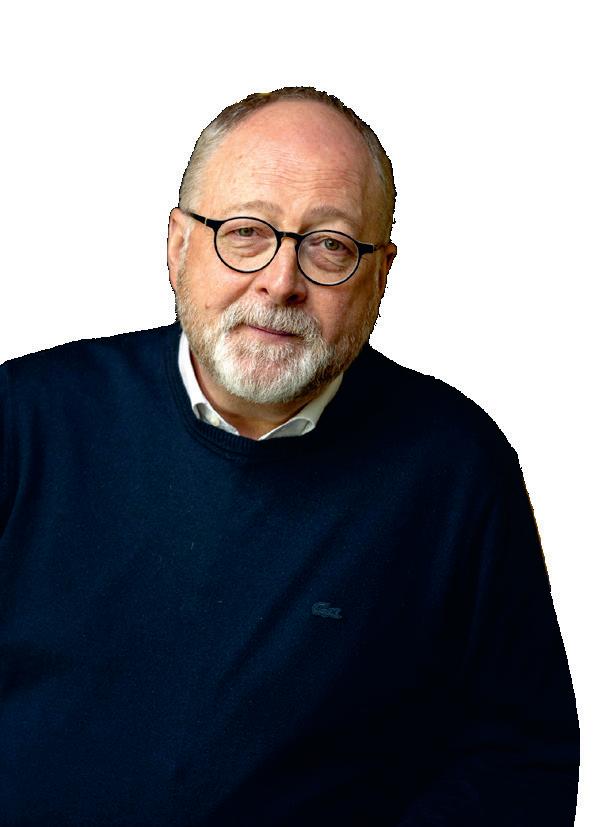
A great number of companies have today realised that they need to be sustainable--not only to preserve the environment, but also to find new business opportunities and increase their long-term competitiveness. In our role as the national innovation agency, Luxinnovation helps companies become more sustainable through innovation. We expect that one trend that will impact the B2B services market in 2023 is the growing demand for support to make businesses more sustainable.
Our role is to raise companies’ awareness of how they act in these areas through innovation and, in many cases, digitalisation. Opportunities abound. A quite obvious topic is replacing fossil fuels with renewable energy, or optimising production processes with the help of digital tools.
Much can also be done on a strategic level. I want to highlight business model innovation, which has a great potential to help businesses find new ways of generating revenue from a more sustainable use of products and resources. Data-driven business strategies can help foster sustainability, and some companies could benefit from AI-powered systems to monitor their global environmental footprint.
I’m convinced that the increased awareness of sustainability is a real game changer and that it will give rise to a multitude of B2B business opportunities in the near future.
Forecasting is difficult, especially when it concerns the future. Instead of guessing, how about agreeing on a few courses of action for 2023?
Scale-up companies are companies which do not accept the status quo. They play to win. Luxembourg has quite a few older and younger com panies that had fantastic successes. It may be tempting for them to play in order not to lose. Ironically, this is a sure way to lose. As entrepreneurs, to stay relevant, we must take up challen ges. A good stance for 2023 is asking yourself, “What can I do about this?” and do it.
We know how critically valuable it is to have engaged, talented individuals. In 2023, I encourage you to ask the following question with your current team members in mind. “If we were to have the opportunity to sign a work contract anew, would we--company and employee--do it again?” How about genuinely developing your talent?
In 2023, entrepreneurs will again need the courage to pick out the initiatives that hopefully yield maxi mum results. The “do less and obsess” approach will give the teams a clear view of the finishing line and celebrate successes. Leadership has the task of creating clear finishing lines, but we often forget that, for there is always something more to do. So don’t let such opportunities for celebration go by in 2023.
Keep scaling, and don’t mess up.
Sasha Baillie CEO, Luxinnovation
“I’m convinced that the increased awareness of sustainability is a real game changer”
Sasha BailliePhotos Romain Gamba, provided by Jean-Marc Fandel

2023
Entrepreneurs are confronted with rising energy costs and inflation, while tensions on supply chains are increasing and consumers could cut back on spending in times of uncer tainty. Although Luxembourg’s GDP growth predictions are slightly above the eurozone average, geopolitical unpredictability lowers the confidence level into the economy.

“I am an optimist and strongly believe in the agility of our entrepreneurs, who already proved an incredible resilience, fearlessness and creativity in the management of the covid crisis,” Even said.

“Social and financial risks, among other treasury shortages, will most probably be sources of difficulties in the coming months. What will make the difference is not only to be able to manage the short term, but to prepare in a solid way for the long term, initia ting the transformations for tomor row,” he added.
In an inflationary market, margins need to be protected in priority… Crises make it more difficult to access capital. Investors and banks become more selective in investments, and financing rounds are less frequent, so protecting existing capital is key.
Over the longer term, it is important to ensure a clear vision of the cost price throughout the entire value chain… all changes need to be driven by one guiding principle: creating value for clients to stand out from the competition.
This impossibility of predicting the future is particularly true with regard to the evolution of the labour market, which is an area where forecasting errors are common… Work has the annoying habit of doing as it pleases. This warning given, it nevertheless seems to me that it is not taking too much of a risk to affirm that in 2023, the metamorphosis of the wage-earn ing society represented by teleworking should continue to animate the debates and cause serious headaches (amongst others) for company directors, human resources departments, the ministry of finance, employees, lawyers specialis ing in labour law and economists.
If this should be so, it is because, obviously, the shock of the massifica tion of telework that has taken place since the health crisis is a persistent shock, but also because many struc tural questions posed by this new way to work are still without definitive answers (or not really discussed):
• What will be the impact of teleworking on investment in office property?

• What is the cost of teleworking for the retail and catering sectors in a country where almost half of the employees live abroad?
• Is there a need to supplement labour law with telework law?
• Can teleworking be an objective ally in transforming part-time into full-time work?
• Does telework have a positive impact on productivity?
• Etc.
2023 is expected to be marked by historically high inflation in Europe, in part stimulated by the energy crisis linked to the war in Ukraine. Following a 3% GDP increase this year, it’s antici pated that the eurozone will stagnate into 2023.
Supply problems befell industry and construction in 2021, although this year the sectors faced a drop in demand. Meanwhile for banks, a drop in loan demands plus stricter granting conditions means they won’t necessarily capture the opportunity potentially gained from increased interest rates.
Real GDP growth is expected to be 1.7% for end 2022 and 1.5% for 2023. Households, faced with high inflation concerns, point to a bleak end of year.
Runaway inflation should be somewhat less pronounced in Luxem bourg. Statec expects that purchasing power will increase by 2% into 2023, with low-income households being particularly supported following tripartite negotiations. Furthermore, public deficit could reach 3% of GDP next year.
While unemployment is expected to rise into 2023, there’s currently a historically high level of vacancies. A stagnation in employment is antici pated, even if in Luxembourg it may be less marked. The projection is that unemployment may reach 5.1% of the active population (versus 4.8% in 2022).
Michel-Edouard Ruben Economist, Fondation Idea
WAYS OF WORKING
“Many structural questions posed by this new way to work are still without definitive answers”
Michel-Edouard RubenPhotos EY Luxembourg, Romain Gamba, Mike Zenari
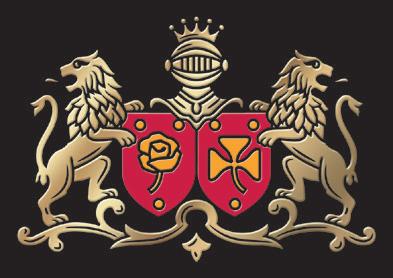



Information technology, and specifi cally cybersecurity, are fast-paced, ever-changing fields that offer many opportunities and challenges. One challenge is the number of unfilled technology jobs. There are about 3.7m cybersecurity jobs open today globally, and the number keeps rising. This is a great opportunity to increase the number of women in these roles.
Almost half the people working in cybersecurity jobs today enter from outside the IT sector. This new trend can help us attract even more women to IT. We need to encou rage and attract girls and women to cybersecurity as early as possible by considering candidates from different backgrounds.
One new trend I didn’t see when entering the field some 20 years ago is the number of female mentors in IT and cybersecurity. Many associations, such as Women Cyber Force, encourage and educate women. I’m the president of this association, and I feel that if these groups help more girls or women consider IT, then we’re on the right track.
But let’s be honest: while many women are finding their voices in IT, many others are being treated unfairly. I hope the dialogue increases until we reach diversity and equality in this field. All women deserve to be treated equally and recognised as valued professionals in all parts of society.
Healthcare will increasingly focus on patient-centred translational medicine. It will connect the lab bench to the patient’s bed, familiarising patients with research and giving them a voice.
The LIH is collaborating with the CHL and other hospitals to open the Fuerschungsklinik Lëtzebuerg, a translational research centre. The LIH continues to support research on Parkinson’s disease and will initiate research in a number of other immunerelated diseases in the context of Clinnova, a new programme. With the health ministry, we are also launching a comprehensive translational cancer centre. It will offer precision medicine to cancer patients, including genetic analysis.
However, the LIH’s strategy for precision medicine goes beyond classical analyses. We are developing powerful digital phenotyping approaches to better understand disease subclasses or stages and employ AI to find the right drugs for patients with immune diseases.
Furthermore, the LIH is building a data integration centre, which will combine clinical data with recent scientific insights. Regulation regarding the security of this new data is crucial.
New technologies will support healthcare procedures and provide data. With PEARL Digital Medicine, we aim to support the development of digital healthcare solutions.

Ulf Nehrbass CEO, Luxembourg Institute of Health
“New technologies will support healthcare procedures and provide data”
Ulf Nehrbass


2023 will be a challenging year. But so were the last three years. There has been a clear change in society, industries and business models, which will continue in 2023.
Change isn’t only a risk--it’s also an opportunity. We’re faced with megatrends like connectivity, autonomous driving, sustainability, ecarbonisation, electrification and mobility as a service. The business model and IT landscape must be aligned to the future. As Losch Digital Lab, we support the Losch Group and external customers with modern software solutions and services.
We want to go further and make mobility more sustainable. We’re already on the road internationally with our on-demand Savvy Mobility software. Airport shuttles, barrier-free transport and taxi sharing make transport more efficient.
But we’re confronted with enormous change not only in the mobility sector. Cybersecurity is more important than ever, and the battle for talent is in full swing. It’s no longer enough to find qualified employees. Employers must offer an opportunity to develop. We need to promote, support and invest in employees.
Innovation is our drive, and software development is our passion. In the coming year, we want to expand our market share and help our customers succeed.
I look forward to 2023 with confidence and excitement.
In the insurance sector, trends related to technological innovations revolve around six main areas that should be strengthened in 2023: digitalisation, cyber threats, regulatory obligations, new ways of collaborating, recruitment and environmental impact. As observed in the banking sector, I am convinced that 2023 should see an acceleration in the adoption of cloud solutions.
All companies are concerned by cyber threats and must put in place a cybersecurity strategy including tools like firewalls, but also processes and user awareness. It must be constantly reassessed.
Regulatory obligations with short deadlines are multiplying and are im posed on companies of all sizes. While their objectives are laudable, they weigh on the ability of companies to carry out modernisation projects or innovations for customers.
Hybrid work modes have become the norm. A balance will have to be found between their many dimensions.
Recruitment and retention of competent profiles in new technologies are challenges that local players and the government will continue to meet by pursuing the initiatives being put in place.
Finally, integrating the analysis of our social and environmental impact in our development strategies will be essential in view of the growing consi deration it meets with our customers.
2023
von Reichenbach Deputy director & CIO, Adem

Governments and public employment services, such as Adem, must constantly innovate to find new ways to reduce the “skills gap.” Our recently released strategy includes two objectives that focus on technology and innovation: reach high levels of operational and organisational excellence and agility, and digitalise service offerings and internal processes.

We are implementing this strategy by launching eAdem, a holistic programme with a human-centric approach. eAdem contains a portal called MyAdem that facilitates employment and allows clients to interact with us in real time.
Among other functionalities, MyAdem assists jobseekers by matching their CVs with existing offers. Skills gaps can be tackled by Adem’s learning, reskilling and upskilling initiatives, giving jobseekers an edge to their individual profiles.
We also aim to implement artificial intelligence (AI) tools where appro priate and ethical. AI can increase efficiency by assisting in repetitive tasks, but also support counsellors in the field of profiling and matching. AI can help prepare emails that a human agent will approve, or chat with clients and advise them on specific topics.
eAdem is a solution that covers the entire lifecycle of our clients: jobseekers, employers and employees considering a change in career paths.
The quest for talent, cybersecurity and green tech are likely to shape priorities and developments in 2023 and have a big impact on businesses across sectors. The Great Resignation has touched IT professionals. The lack of tech talents is a global phenomenon likely to be high on the agenda of business leaders everywhere. End-user computing is gaining traction. Low-code or no-code developments are increasingly seen as an alternative to complex software developments. They allow non-IT employees to automate tasks and accelerate the digital transformation, saving time, costs and resources. The second big trend for 2023 is cybersecurity. Cybercrime is profitable and well structured.
All companies and institutions must adapt their protection of systems and data. The third trend is green tech, which has two dimensions: developing clean tech or digital alternatives to high-emitting activities, and optimising the emissions of operations and activities to make IT more sustainable. We must look at infrastructure, how we build applications and how employees use IT equipment and tools. Fostering awareness and changing behaviours will be key in 2023, whether it means non-technical employees taking a more active role through end-user computing, mitigating cyberthreats or making IT more sustainable.
The covid crisis has accelerated innovation and digitalisation by pushing banks to massively adapt and adopt new technologies. Five major trends are on the horizon for 2023, which looks to be a promising year.
Augmented artificial intelligence: companies that use the cloud will be able to better exploit data for operational efficiency, risk management and customer experience. AI will become asset managers’ best decisionmaking companion.
Tokenisation and crypto: a pilot on tokens in March 2023 will require strategic positioning. Incidents in 2022 have also highlighted flaws and reinforced the idea that the cryptocurrency sector must be regulated.
Web3, metaverse and new business models: Web3 refers to a third generation of the internet where services will be based on blockchain and cryptocurrencies. New business models will emerge in 2023. Colossal investments allow us to imagine metaverses where the physical world mixes with the world beyond.
Cybersecurity: the economy’s digitalisation leads us to be very careful. Teleworking has increased the risk of attacks, while the internet of things makes us more vulnerable. Education will be key to countering attacks.
Responsible finance: global warming and ESG are on the agenda of all companies. Green finance is a must in the world of tomorrow.
“End-user computing is gaining traction”
Laurent PulinckxThierry Frisch, LuxSE, Société Générale Luxembourg



In 2023, we anticipate that cyberattacks will increase again. These will impact any company that doesn’t have secu rity measures in place.
We’ll also see attacks that impact utilities and companies that rely heavily on automation. Utility infrastructures are at risk because they are difficult to maintain and upgrade. Although the systems work, they’re not up to date, making their code vulnerable.
There’s no magical solution. Most networks were created without the idea of connecting them to the internet. Now, if just one computer is connected to a 4G network, these systems can be targeted by an attac ker. You need to invest, upgrade and implement security measures.
Another trend relates to the rise in teleworking. More companies are investing in technologies like ZTNA--Zero Trust Network Access--that give just-in-time access to servers or applications from a user computer. This is key to enable secure access to services inside companies.
The skills shortage is also a reality. Luxembourg’s job market is not as attractive as it was because of telework limitations on crossborder workers, and salary is not a differentiator anymore.
I look forward to what the market will say about the European NIS directive on network and information systems, which will highlight the necessity of IT security.
Advanced mobility solutions are transforming the tyre industry and will accelerate in the coming years. Goodyear is investing in digital products and services related to en ergy efficiency, vehicle safety features and intelligent connected products.
In 2023 and beyond, key trends, especially in the areas of fleets, autonomous, connected, electric vehicles, sustainability and simulation capabilities, will be the primary catalyst for most industries. They will improve productivity and lead to unique products and solutions to generate value for customers.
Goodyear will continue to deliver service offerings around connected solutions. We use artificial intelligence algorithms with real-world data and simulations to understand product behaviour and to modernise and optimise processes.

We’re also adopting a “digital twin” approach. This digital representation of a physical product will allow us to have only one physical iteration during the tyre development phase, increasing product quality, efficiency and delivery time.
Sustainable sourcing helps us responsibly manage the materi als we use. That includes sourcing sustainable natural rubber, increasing sustainable material use, pursuing raw material traceability, removing materials of concern and proactively managing supply chain ESG risks.
It’s an exciting time to be in the world of artificial intelligence (again). Generative AI has hit the mainstream. DALL·E 2--a new AI system that can create realistic images and art from a description in natural language--and similar content-generating AI systems have opened new possibilities for writers and artists.
But they’ve also raised concerns of the impact on their livelihood, the use of their works in training AI models or even fear that the era of general AI that surpasses human intelligence in all aspects is already here.
Spoiler--we’re not quite there yet.
I predict 2023 to be the year when AI-supported content generation disrupts established markets. Think about a text-generating tool that helps you when you get writer’s block. Imagine a drawing software that allows artists to quickly experiment with different styles and techniques and helps create new and original artwork. Disclaimer: I used one of those text-generating tools to write that last sentence.
In my view, 2023 in AI will be truly exciting. Are players like Microsoft and Adobe ready to take on upcoming competitors? Can Luxembourg startups use Meluxina to create disruptive solutions? Will the European AI Act hurt or empower the market? One thing is certain: AI will not disappear from our radar anytime soon.


Romain Hansen Senior director innovation technology, Goodyear
“Goodyear will continue to deliver service offerings around connected solutions”
Romain Hansen



Business confidence in the future of the Luxembourg economy over the next two to three years has fallen sharply compared to the previous six months, to an unprecedented level below that recorded during the covid-19 pandemic.
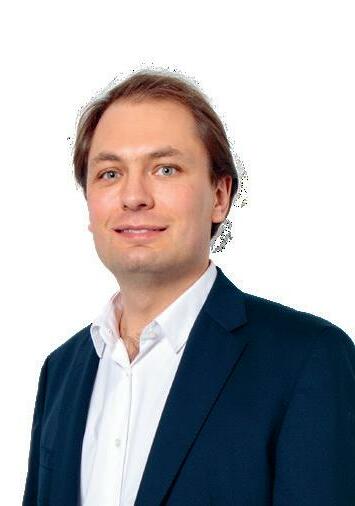

Three priorities stand out for the government ending its term of office and the one starting in a year’s time. Firstly, energy cost containment takes a prominent place as a strategic issue and as an urgent need to be addressed in order to change the daily life of businesses. The statement “we need to move towards resource independence at European level” received strong support.
The facilitation, simplification and acceleration of administrative procedures is a second strong issue. Companies still feel largely overwhelmed by the numerous administrative formalities, multiple information points and authorisation requests to be made to the various ministries. They are asking for these procedures to be simplified, digitised and for information to be increasingly grouped together […]. Finally, increasing flexibility in the labour market (work organisation, teleworking, etc.) rounds off this list of priorities for the next legislature.
The need for mobility in our city is growing. Today, half of the trips made in Luxembourg City are below 5km, so walking and cycling can be real alternatives. Yet for these alternatives to become more attractive, we need to upgrade public spaces, promote walking-friendly streets, and create an interconnected network of safe cycle paths throughout the capital. The tram and other modes of public transport will have to be further developed, and improving the carsharing offer can ensure that everyone has access to a car without having to bear the related costs.
Simultaneously, we should reconceptualise the design of our neighbourhoods to improve the everyday lives of residents. By making sure shops and services are available close by, we decrease the need for travel and free up precious time. Removing through-traffic from neighbourhoods would reduce unwanted pollution and noise while also making the streets safer.
The lack of affordable housing must also urgently be tackled. We need to double the offer and create a taskforce that brings together all relevant actors to speed up the development of housing projects. We also have the obligation to find new ways to strengthen the participation of the city’s foreign residents--to really listen to residents’ opinions and ideas ahead of the development process of new projects and to introduce participatory budgeting.
“The lack of affordable housing must also urgently be tackled”
François BenoyPhotos Matic Zorman, Romain Gamba Miltgen Co-lead
In order to meet the challenges of the future, which go far beyond what we have experienced so far, courageous and responsible decisions have to be made that benefit everyone. This means that the municipality must keep investment at a high level, primarily in the massive expansion of the real estate portfolio the majority of which should be affordable housing. Social work must be promoted through the city-wide use of street workers and the support of non-profit organisations. However, this also means that the Nimby attitude that has shaped urban policy over the last 50 years finally has to be discarded, to acknowledge that it is also the duty of a capital to take care of problematic target groups.
Finally, everything must be done to promote the political participation and registration on electoral lists of non-Luxembourgers, who make up 70% of the city’s population. This should not only take place six months before the local elections, but systematically with targeted campaigns and the promotion of real citizen participation, for example by using citizens’ committees with binding goals.


It is no longer enough to hide behind expensive and pres tigious projects, but to focus on the needs of all citizens, to ensure quality of life for the future and to make political decisions that will still be valid in 20 years.
We will see a different use of social media in the upcoming elections. The lead candidates will mostly have professional appearances on the most important platforms for their consti tuents while maybe neglecting those where they would receive too much negative feedback.
The national campaign offices at the same time will be confronted with a deluge of data and activity from their candidates which needs to be screened--including comments by voters--to make sure that a campaign can stay on message.
Politicians and their campaigns now need to be vigilant, not to stretch their campaign too thin while still reaching their electorate in an efficient way. Sure, part of that can be done by spending ever more money on paid for reach through ads, but is that sustainable?
Voters will also have a key role to play to keep campaigns honest and point out if their message starts to be different from one platform to the other.
At the same time, the Luxembour gish proportional system means that every campaign is confronted not only with one spokesperson but with 60 different candidates who might use the platforms in wildly different ways.
The challenge for society will be to keep our humanity. To not fall into the trap of polarized politics like in other countries.
2023
Sérgio Ferreira
For more than 40 years, ASTI’s philosophy and actions have been expressed in its slogan: “Living, working and deciding together.”
In 2023, the “deciding together” component will be more prominent, as there will be a major novelty in the local elections. Any resident foreign national, whether a citizen of the EU or not, will be able to vote on 11 June. There are no conditions. You just have to register by 5pm on 17 April in the municipality where you reside, or via Guichet.lu The amendment of the electoral law, made last summer, puts an end to 30 years of discrimination.
Since the 1992 Maastricht Treaty, Luxembourg has been the only EU country to impose a residency clause for EU citizens’ participation in local elections.
But how can we encourage more non-Luxembourgers to register?
There are no miracle solutions: we must communicate, communicate, communicate. It is just a pity that, in the draft budget for 2023, the ministry of family and integration grants the ridiculous amount of €120,000 for the campaign to encourage registration for both the 2023 municipal and the 2024 European Parliament elections.

But it is not only the government that must assume its responsibilities. Political parties can also play a part, in particular by picking nonLuxembourger candidates in their lists. The example of the commitment by foreign candidates can have a multiplier

Let us not forget that Luxembourg is a small, open economy which needs the services of foreign and often nonEU providers to ensure its functioning.
Faced with a tight labour market, companies must be flexible and be able, as far as possible, to adapt the organisation of their employees’ working hours to the demands of the latter in order to attract and retain labour. The new generations have different expectations regarding the organisation of their working lives, and the current rigid framework, based mainly on mistrust of employers, is no longer able to meet these demands.
Industry is also resolutely commit ted to ecological transition. It must not be held back by overregulation!
The state is failing to create solid framework conditions or appropriate instruments for companies to comply with ambitious regulations in the field of climate and environmental protection, so that it must continue to impose rather than promote and encourage change. This vicious circle undermines the competitiveness of companies, jeopardising their European production capacity, and represents a considerable risk to future industrial investment efforts.
A future government must under stand that companies need confidence and predictability to face current challenges and to invest in the develop ment of their activities in Luxembourg.
The commune of Hesperange, which borders Luxembourg City to the southeast, is a telling example of an urban Luxembourgish environment: a narrow majority of its inhabitants are non-Luxembourgish and among its chief concerns are traffic and housing.
Roads have already been disrupted in the commune thanks to the Luxem bourg City tram, which is currently being extended to the Cloche d’Or. “In 2023 there will especially be works in Howald,” comments mayor Marc Lies (CSV), specifying that the tram will only be operational there in the first half of 2024.
On infrastructure more broadly, Lies expresses frustration at the snail’s pace of many projects. “Due to several laws,” he continues, “like the environmental protection law, in the last years we have gone much more slowly with new projects, with new infrastructures, even with house-building.”
“We have to be more pragmatic,” he goes on. “Our laws concerning the construction and housing markets -- they mean that things are getting trickier, more complex… and that’s not, for the time being, the way we should work.” He reckons that housing prices won’t drop in 2023; they may even rise.
As for integrating non-Luxembour gish residents, who in Hesperange make up 54% of the population, Lies mentions a new app, HOPLR, that helps neighbours connect. “We have to get more active,” he says of getting to know newcomers from abroad.
Lies Deputy mayor, Hesperange
Political director, immigrant rights association ASTI
Michèle Detaille President, Fedil (Luxembourg industry federation)
“Companies need confidence and predictability to face current challenges”
Michèle DetaillePhotos Romain Gamba, Matic Zorman , CVS



Statec projects that we need to create 70,000 jobs over the next five years to finance the welfare state. This in turn requires available housing, efficient infrastructure and mobility services, but also excellent education and inno vation facilities, an attractive tax and legal framework, and everything that contributes to the quality of life we all aspire to. Instead of trying to solve different issues separately, we need to adopt a systemic approach. […]
I’m optimistic by nature: despite the challenges, I believe we can safeguard our prosperous way of life… if we embrace change. […] Sticking to our values means being inventive, hard-working, open to learning new talents and welcoming others.
Taking into account our country’s-and our planet’s--limited resources, we must invent a new model for sustainable prosperity with human talent at its heart. Luxembourgers should expect their political leaders to develop a sustainable vision for the next five, ten, and even thirty years.
Given our role as European co-founders, we should also continue to value the importance of European integration: closer integration be tween European countries, integration of Europe with the rest of the world, and better integration of our fellow Europeans in Luxembourg’s public life.

The list of priority issues that the future government will have to tackle urgently is long--very long, in fact!
Starting with taxation. Our tax system today is deeply unfair. Since the end of the 1990s, we have witnessed an enormous reverse redistribution, i.e., from the bottom (small- and medium-income house holds) to the top (companies and social classes with high and very high incomes). It should be noted that income from work (wages) is currently taxed up to four times more than income from capital (dividends, interest income, profit sharing, etc.). There is therefore an urgent need to restore more tax justice in this country. In this context, the OGBL demands, first of all, the introduction of a mech anism for automatic adjustment of the tax scale to inflation. Why should this be done? Because in the absence of such a mechanism, every time household incomes rise (for example with the index), people are directly subjected to unjustified tax increases and thus to losses of purchasing power. This phenomenon, known as “cold progression”, mainly affects the lower- and middle-income classes.
But of course, there is more to tax ation than that. The OGBL has a whole package of proposals to make here, which are available to the government if it really wants to do something about it. All it has to do is help itself.
The economy is undergoing a profound transformation marked by the goal of decarbonisation and ecological reconstruction. At the same time, the pandemic has changed the needs of employers and employees for flexibility.
Employers are aiming for a flexible and agile organisation of (working) time--given the external pressures from their customers and suppli ers--while employees aspire to an optimised “work-life balance”. All this should necessarily lead to a revision of the modalities of work organisation in the framework of an internal employer-employee dialogue, so that SMEs can become more resilient and adaptable.
In a constantly changing working environment, it is a question of accepting the new reality that employment must necessarily become more flexible, whether in terms of its form, its contractual framework or in relation to the actual organisation of working time.

These different facets of flexible employment must necessarily be taken into consideration when it comes to developing Luxembourg as an attractive, competitive and truly cross-border labour market.
It is equally essential to create new forms of work that combine the guarantees of social protection (from an employee perspective) with
Tom Wirion President, Chambre des Métiers
Nora Back President, OGBL
“There is an urgent need to restore more tax justice in this country”
Nora BackPhotos Matic Zorman, Romain Gamba












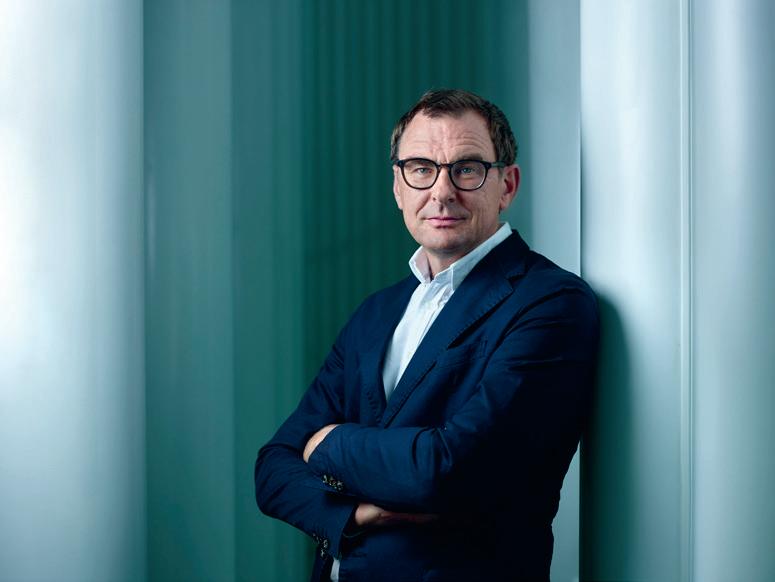
Based on his personality, Gehmacher says he is optimistic not only for the sector, but also for all other sectors and the country, particularly in light of the war in Ukraine and the energy crisis.
He adds that during covid, the government made it “clear that they would like to keep culture, music and theatres open,” putting it in a much better position than in countries where the sector had to start from scratch.
While the main activities of the institution will continue to prioritise classical, but also non-classical music, he highlights three key priorities for the coming years, even beyond 2023.
First, the offer for young audiences. “[We want] to really create weekends that entice a large group of people to explore the offer for young audiences based on themes--so we discussed sustainability and we will do a weekend around music and nature, for example, and then [other] similar [themes] in autumn.”
Second, he explains a renewed need to really celebrate live music.
Third, he emphasises the significance of continuing the institution’s tradition of celebrating diversity, with a focus on quality, throughout music history. He goes on to say that the Philharmonie will continue to support artists, particularly those who are of interest to any group of people living in Luxembourg.
From 31 May to 4 June, Luxembourg City will host the 2023 edition of the European Design Festival. On this oc casion, the Design Luxembourg asso ciation, which is organising the event, has planned five days of festivities in which creative people from all over Europe and the general public are invited to participate.

On the programme? Conferences, studio visits, workshops, a designer market and exhibitions. In addition, Luxembourg creations covering all design disciplines will be honoured during an evening dedicated to the Luxembourg Design Awards, while the famous European Design Awards cere mony will reward the best practices in communication design.
For Design Luxembourg, which represents professionals in the sec tor, the aim of the event is twofold: to create, via an ambitious festival programme, a platform for promoting and enhancing design, its players and local businesses, and in so doing, to highlight the crucial issue of the status of design in Luxembourg. In short, it will be a matter of seizing this unique opportunity in terms of visibility and representation to elaborate a strategic vision for the sector and to lay the foundations for its future development.
coordinator, Design Luxembourg
“People from all over Europe… are invited to participate”
Nadine ClemensPhotos Sébastien Grébille, Romain Gamba, Marie Russillo, C2DH Michelle Friederici President, Ordre des Architectes et des Ingénieurs-Conseils

It is important not to lose sight of the longer-term objectives. The European Commission presented the “New European Bauhaus – NEB” in September 2021, which combines the global vision of the European Green Deal with concrete changes for our living environment.
Foreign initiatives, such as the demand of the German architect’s body BDA for a moratorium on demolitions, the “Gebäudetyp E” for administrative simplification, or the Spanish law on the quality of architecture, show that the problems are similar to those encountered in Luxembourg.
The Ordre des Architectes et des IngénieursConseils (OAI) has always been active in these areas to raise awareness among its public sector partners to find effective solutions with the aim of improving the quality of our living environment.
In view of the legislative elections in 2023, the OAI is currently preparing its proposals that will be sent to the political parties in the running.
Another priority for the OAI is the allocation of tasks to OAI members. It is a question of proposing simple and adapted procedures to contracting authorities, whether in the public or private sector, based on quality criteria rather than on fees. Even though we are living in uncertain times, the members of the OAI, with their holistic view, are trained professionals, responsible and able to design suitable projects.
New technologies make it easier to visualise and interact with history. Wieneke explains that predicting trends in advance is never easy, but a clear observation that will apply in 2023 is the results of prior efforts in AI technologies. “AI tools which used to be only used in lab environments by certain specialists are now open to a broader audience… for C²DH [for example], breakthroughs in using speech detection technologies have become so good over the years,” he says, adding that AI usage will become more relevant.
Driving participation and stimulating discussions and storytelling via a bottom-up approach is also an interesting trend. “We’re moving in the direction of giving people the means to work for themselves. Putting out tools and seeing what people do with it is something I’d like to see more of in 2023.” An intriguing participatory project example is undoubtable the Digital Shoah Memorial. “We have a lot of very fascinating projects and it’s hard to choose,” says Wieneke, citing projects like the WWII virtual exhibition, Valérie Schafer’s research on memes from a historical and contemporary perspective, the journal of digital history, or the Letterbox project--on the role and history of shell companies and holdings in Luxembourg--as long-term ongoing projects to follow.

2023
Rockhal (or the legal name, Centre de Musiques Amplifiées) is a leading venue for live entertainment and is also famous for Rocklab, a promotion space and incubator for Luxembourg’s music scene. CEO Olivier Toth (and president of the European Arenas Association) highlights 2023 trends that will consolidate efforts in the pre- and post-covid eras, such as the launch of Rocklab Live Sessions in 2023, a spin-off of the Rocklab Sessions that will involve a live audience. The overall goal remains to reflect the richness, volume of creativity and diverse spectrum of artists in Luxembourg.
In 2023, he anticipates more release shows by Luxembourg artists, citing the Ptolemea and Praetor projects as two examples. Toth emphasises Liveurope’s (a network of 22 venues) commitment to bringing the diversity of Europe’s music scene to a wide range of audiences, saying that music exports will go on in Luxembourg and Europe. “2023 will be a very busy year,” he says. And while there may be fewer shows, there will be a very diverse range of concerts sector-wide, he reassures, adding that readjustments will greatly enhance the audience’s experience. “There’s a lot of positivity in the market that [shows] the sector is [progressing] and being really resilient in rebuilding despite the tensions and struggles.”
Next year, footwear trends will be bigger in volume. Oversized shoes, e.g., sneakers, have been moving in this direction for some time, and this is crossing over into sneaker-casual hybrid shoes. The Crocs phenomenon of fully moulded, mono-material clogs and easy slip-on shoes will continue. New technology in 3D printing is changing the approach to shoe construction, and with this will come new shapes and aesthetics. Sandals with flip-flop straps, flats and mid-heel variations are coming back.
The whole industry is moving slowly but surely in the sustainable direction. But there’s still a long way to go in footwear, in particular because even eco-friendly, sustainable material options are usually linked. While advances have been made with more environment-friendly glues, if individual materials cannot be easily separated, then recycling is almost impossible. The way forward will either be stitch-only constructions or mono-material forms.
The sneaker market is the main driving force in footwear innovation, so it’s great to see more specialist sneaker stores in Luxembourg. Besides innovation, the most important factor looking ahead is a need to shift attitudes to consuming [less] products. I’d like to see more resale, more vintage, more acceptance of the circular economy.
Pempinello CEO, Aperinetwork

As the demand for social events grows, we will see increasing afterwork offers in 2023 focused on three key elements.
Location: there is an explosion of variety of venues in Luxembourg, there is more and more competition, and restaurants or bars have to compete with each other to attract the growing population, hungry for entertainment.

This is an opportunity as it allows the offer to be refined by proposing more profiled events based on different themes and interests. People are looking for places that best suit their vibes and are cool and cosy. Locations are doing their best to innovate in terms of design and interior and this will continue in 2023.
Drinks: there is a huge trend of mixology and fusion drinks. Not only food requires attention, but cocktails are also an essential part of a good afterwork. I see the bars in 2023 looking for excellent bartenders ready to surprise customers with new flavours and experiences, also using cooking ingredients. Good alcoholfree drinks will be more in demand, as consumption is evolving towards a healthier lifestyle.
Music: There is a wide variety of music offered by the growing number of events. It is a good thing that everyone has their own style, which allows people to choose according to their mood or taste. You can find reggaeton, variety, electro, Latino, often with an entertaining element that adds a twist to the music style.
Sarah Zigrand Design consultant and head designer Woman Shoes Collection, Jil Sander
“The sneaker market is the main driving force in footwear innovation”
Sarah ZigrandPhotos Romain Gamba, provided by Sarah Zigrand, Guy Wolff

2023
Simon Independent theatre directorWhat is driving the growth of English-language theatre in Luxembourg, and will it continue in 2023?
Since 2007, independent theatre director Anne Simon has observed the growing trend in English-theatre production, and she says the oppor tunity that Luxembourg has is that theatre makers come from different backgrounds and “it gives us the [chance] to mix styles, [given] the crossroads of cultures.”

She hopes that, in 2023, interna tional audiences will remain open to this mix of styles, forms and back grounds, which she says is already happening gradually, but also advises that theatre makers need to strike the right balance between the various theatre forms.

The strength of English contemporary works, in comparison to others, in her opinion, stems from continuous support for new playwrights, includ ing emerging to mid-career artists.

She adds that, while immersive forms of theatre are gaining traction in Luxembourg, she hopes to see much more in 2023 but cautions theatre makers that “if [they] introduce those forms, [they] also have to guide and give people the tools to be able to use them.”
Simon is currently working on immersive theatre projects for 2023, and she sees “an opportunity there.” She explains that immersive theatre increases audience engagement and encourages people to rediscover
Luxembourg’s literary landscape is one of great diversity and versatility. And it is one of the unusual character istics of this literary field that, since its very beginning, literature in Luxem bourg has been multilingual. German, French and Luxembourgish are the predominant languages of literary expression, but this linguistically volatile and creative environment also allows for other languages to assume literary relevance and to become an integral part of the cultural landscape.
This is particularly obvious in the case of English. In 2022, three of the four submissions which were awarded a prize in the Concours Littéraire National, a literary award in which manuscripts are judged anonymously, were in English.
This is a telling example of the receptivity of the literary environment, and it allows to highlight develop ments that can increasingly be seen in other literary cultures. In combination with a growing interest in political and socio-cultural topics, and with the add ed perspective of academic research, this makes for a new contemporaneity in Luxembourgish literature, where a wide array of authors and languages meet around a complex discourse of identity and literary expression.
Together with my artist colleagues, we are interested in the evolution of the professionalisation of Luxem bourg artists. We are optimistic about the coming year, given the progress made by the ministry of culture in re cent years through the Kulturentwéck lungsplang and the establishment of a new dissemination promotion and support body, Kultur lx.
I hope that the European Capital of Culture adventure will leave a lasting impression on the public and deci sion-makers, and that we will contin ue to provide artists with the means (financial, time-wise, and creative) to extend certain projects and start new ones that are equally ambitious.
In addition, the AAPL (the association of visual artists in Luxembourg) is working on projects that will benefit the profession. This year, we’ve been working on the ministry of culture’s draft law on public art commissions. This law proposes the formation of a new artistic development committee tasked with raising public awareness of public art and assisting various actors, such as municipalities, funds, and artists, in the development of their projects.
The AAPL is also working on a tariff recommendation for the profession, and is in discussion with artists, museums, cultural institutions, and the ministry. The project will be launched early next year.
Nathalie Jacoby Director, Centre National de Littérature (CNL) –National Literature Archive LITERATURE
“Luxembourg’s literary landscape is one of great diversity and versatility”
Nathalie Jacoby
25.01 10×6
Ten CIOs share the main challenges to be faced in 2024 in their respective sectors: financial centre, services, industry, institutions. Cybersecurity and the cloud will undoubtedly be discussed during this 10×6, which will bring together tech experts from large companies and institutions as well as suppliers. 28.02 10×6 Women on board
Three years after its first “100 women for your board” listing, Paperjam releases a new edition. On the eve of the magazine’s publication, the 10×6 stage hosts 10 testimonials on diversity of background and perspectives and the benefits of having more women on boards of directors. 25.04 10×6 PME : scale me up !
As the backbone of the Luxembourg economy, SMEs are showing inventiveness and pragmatism in order to accelerate and structure their growth in a staggered way. Innovating, recruiting, producing, selling, raising funds: these leaders face many challenges. They will be honoured at this 10×6.
26.05 10×6
Alternative investments

Alternative asset management is a globally recognised expertise of the Luxembourg financial markets. These asset classes, which are less liquid than traditional investments, give rise to a diversity of investment vehicles and strategies, which will be discussed at this 10×6. 20.06 10×6
Architecture + Workspace
Ten architectural offices in Luxembourg present their selection of workspace projects. This is an opportunity to learn about new uses and innovations in the design, development and layout of offices and industrial production sites. 11.07 10×6 Talent acquisition Labour shortage is certainly the most burning issue of the last few years, as it affects all sectors. How to recruit? In this 10×6 and in the Paperjam supplement, experts and HR managers share their best practices for attracting, hunting, selecting, recruiting and onboarding talents.
24.10 10×6 Successful strategies
From theory to practice: 10 leaders will share the story of the design and implementation of their business strategy. Industry or services, from the initial business plan to the successful exit, what does the reality check teach us? 21.11 10×6 Generation Z
The most connected of all generations, the zoomers (up to 27 years old today) are succeeding the millennials and are gradually entering the labour market. What do these new consumers, citizens, employees, colleagues and even bosses feel, want and think? Ten inspiring testimonials from young speakers.
Ten experts speak on stage for six minutes each before an audience of up to 600 people. This is the business club’s not-to-be-missed monthly flagship event. Eight sessions are scheduled for 2023. Presentations are given in French or English, depending on the speaker’s preference. Simultaneous translation into English and French is available. Discover the full programme here
 , Luxair
, Luxair
2023 will bring new challenges, especially linked to the energy crisis.
Aviation and tourism will again be heavily impacted. The crisis will lead to increased prices for the whole industry. But Luxair and LuxairTours promise to do their utmost to main tain prices in line with their high l evel of service, and not to change the price once a booking is confirmed by a passenger.
As a responsible airline, Luxair is committed to limiting its environ mental footprint as much as possible. In 2023, it will continue efforts to achieve net-zero carbon emissions by 2050. We’ve already made steps towards this goal. In June 2022, Luxair introduced its carbon offset programme. We’ll also refleet our current fleet--modern technologies are about 20% more efficient than our current planes.
Luxair isn’t stopping there--it’s reducing energy consumption in its buildings, while LuxairCARGO is on the way to its third Lean & Green star for reduced CO2 consumption.
Climate change will affect all of us. All our consumption should be so cially and economically responsible.
Aviation is linked to over 20,000 jobs and contributes a lot to Luxembourg’s economy. We have an important role in maintaining these jobs, and we count on the Greater Region to help us keep Luxair socially and environmentally sustainable.

The vehicle fleet is aging, and the risk of breakdowns is increasing accordingly. The lack of new vehicles available on the market (due to the shortage of semiconductors) and the tendency to postpone purchases in a context of crisis and uncertainty are only accelerating the situation. For the first time, second-hand car registrations were higher (58.2%) than new car registrations (41.8%).
With a fleet made up of 10% electrified vehicles, of which only 2.7% are 100% electric (i.e., approximately 11,500 cars out of a fleet of 424,000), the objective of 49% electrified vehicles by 2030 seems difficult to attain. Today, diesel engines represent the majority of cars on the road. By replacing conventional diesel with HVO diesel (hydrotreated vegetable oil, a synthetic paraffinic diesel, certified sustainable, made from sustainable vegetable oils or from waste reprocessing), it is possible to immediately reduce CO2 emissions by up to 90%. However, it is overtaxed.
It is up to elected officials, one year before the legislative elections in Luxembourg, to consider without delay access to alternative energy sources to electricity, which we know will not be able to meet all mobility needs, especially for professionals.
CEO
Jean-Claude Juchem CEO, ACL
“It is up to elected officials… to consider without delay access to alternative energy sources to electricity”
Jean-Claude JuchemPhotos Patricia Pitsch, Matic Zorman, CFL, Luxembourg City Tourist Office
Thanks to its wide range of advantages, such as a reduced carbon footprint or added comfort, train travel is the trend par excellence for the coming years. Unlike many other means of transport, the relaxation that we associate with holidays already begins on board the train, and not only at the destination. In this respect, train travellers are offered something very valuable: time. Time for yourself, time to read, think, daydream or enjoy the scenery, alone or with friends and family.
Luxembourg’s railway network is very well connected to other European ones. From Koblenz, for instance, which we serve hourly from Luxembourg, you can comfortably travel on to Cologne, Hamburg or even Austria.

By TGV, you can also easily reach the most beautiful corners of southern and western France. However, holidays, and especially school holidays, are important periods for us at CFL regarding our expansion works. With our plan to remain our customers’ first choice in public transport, we must provide a rail network that can meet the increasing demand. To make quick progress, temporary closures of some sections of the train lines are inevitable. We plan these closures during school holidays to minimise the impact of our construction and engineering works on daily commuter traffic.
Faced with many uncertainties, it’s difficult to have a clear view of what 2023 will bring. But we want to build our future around resonance, resilience and regeneration.
It’s important for visitors to Luxem bourg City to feel like residents. People seek authentic experiences, to discover something unexpected. We must also be able to recover quickly from diffi culties, and we want our products to be regenerative. More people want to discover nature, and for this, Luxem bourg City is a treasure. We’re looking at many potential projects to develop in this area.
Together with the Luxembourg Convention Bureau, we will strongly promote Luxembourg City as a busi ness events destination. To succeed, we must be agile and flexible. We’re no longer in the scenario where we can plan a conference with 800 partici pants in 2027--no one knows what the world will be like in 2027. We must think in the short term but be prepared for the long term. It’s a different mindset than two years ago.
Finally, whether it’s leisure tourism or business events, quality takes it all. Covid, the war in Ukraine and inflation have taught us this. We don’t only have to think in quantities. Above all, we can excel only if we have the best possible quality in our products and services. And that’s also the case beyond 2023.

In 2023, the Mullerthal regional tourist office will celebrate 15 years of the Mullerthal Trail, a 112km-long hiking trail which won the Unesco Leading Quality Trails – Best of Europe award one year ago. Although firm plans are still in the making, the CEO for the regional tourist office, Linda Salentin, said, “We want to celebrate this birthday together with our partners but also with other guests because the trail is such a great tourism product in our region, and a lot of people can identify with this hiking trail. It’s connecting communities in the area… tourism is emotion.”

Among the office’s partners are hotels, campgrounds, etc. Having a “great network of people working together is a strength in our region and helps us [with] the prices we’re facing,” she added, citing the recent flooding as an example of that community. The CEO adds that she has to “look positively” into 2023. She anticipates there might be more last-minute bookings, as some visitors might be a bit more concerned about their spending next year.
And, while many spent time in the outdoors during the pandemic, this is a trend Salentin said won’t end soon. “The whole outdoor tourism thing is a real trend at the moment. People want to get close to nature and that experience they get when they’re in nature.”
Luxembourg wants to be an authentic destination to which tourists come, but also return. We focus on three axes: active tourism, targeting hikers and cyclists; remembrance tourism, featuring aspects of industrialisation, World War II and European construction; and wine tourism, for which the Wäinhaus infrastructure projects in Ehnen, and the A Possen museum should be completed between 2024 and 2026.
Our approach addresses explorers seeking authentic discoveries, nature lovers focused on active tourism, perfection seekers desiring wellness and luxury shopping, short breakers adept at day tourism, epicurean relaxation seekers and leisure-oriented people looking to get together with family.
Luxembourg is a starting point from which it is possible to visit four countries in four days. It’s even possible to cross the borders by hiking. For years, we’ve wanted to position ourselves as a destination of choice and, for this, we bet on quality.
We see active tourism enthusiasts looking for special places. It’s therefore important to develop a range of accommodations. Luxembourg already has a very good offer, but we don’t have enough unusual accommodations. That’s why the five-year tourism plan provides for a maximum rate of 50% funding to support unique accommodation development projects.
It’s still very early to identify a real trend for 2023. But summer 2023 sales are already open and many have taken advantage of early booking reductions. We’re betting on increased demand for Izmir and Antalya, Turkey. Three other destinations will be added as of next spring--Split, Pescara and Chania--while popular destinations such as Faro and Malaga will be served daily in the high season.
It’s no secret that hotel and fuel prices will increase sharply next summer. LuxairTours has done everything possible so that this increase is not felt in sales prices. Luxair and LuxairTours commit to not asking for any fuel increases once a trip has been confirmed by a customer.
To meet increasing demand for luxury products, the Excellence catalogue, which includes exceptional hotels and services with a complete CO2 offset of flights, has been expanded.
Covid-19 has forced customers to demand more flexibility from tour operators. LuxairTours has integrated free modification of trips up to 14 days before departure as a fixed rule, as well as name modification up to three days before departure.

Passenger experience goes beyond flights and hotels. LuxairTours will remain attentive to customers. The publication of our catalogues in January will be an important point in defining these trends.

Lex Delles Minister for tourism, Luxembourg
“We see active tourism enthusiasts looking for special places”Lex
DellesPhotos Office Régional du Tourisme Région Mullerthal, Matic Zorman

The latest industry news from the heart of Luxembourg’s financial centre. Every Tuesday at 2 p.m.

The number of company members of the largest business club in Luxembourg. 19,000
The number of individuals who are part of the vibrantly active Paperjam + Delano Business Club community with whom you will get to interact. 250
The number of opportunities to network and learn, split into 120 shows, talks, social events and 130 advanced trainings, workshops and webinars.

The number of annual training hours for your employees to develop their hard and soft skills: an additional benefit for you and useful extras for your teams.
9 Sam Tanson, minister of Justice, was the guest of Nathalie Reuter on the occasion of the publication of the 1st supplement Paperjam 100 Lawyers, which honours the 100 most important lawyers in Luxembourg.
3 Jana Degrott (elected representative of Steinsel –Obama Leaders), 2 Charles Margue (MP - chairman of the Justice Committee) and 4 Edoardo Stoppioni (professor of public law at the University of Strasbourg) gathered to debate on democracy in Europe.
On this day of the American Midterms, the introductory speech was given by 1 Michael Margolies Konstantino (deputy chief of mission at the US Embassy of Luxembourg).
On 15 November, 6 Flora Castellani (UEL), 7 Gaëlle Felly, 5 Pol Mellina and 8 Daniel Riedel (BSP) gave an update on the ATAD3 directive and the evolving case law on abuse of rights or hidden profit distributions. For the release of the magazine Paperjam Architecture + Real Estate, Andrew Phillips, the international architect who designed the master plan for part of the Cloche d’Or district, was invited for a discussion on stage. He shared a vision of multiculturality within architecture and urbanism in front of over 100 members.
We would like to thank IKO Real Estate again for their support during this event.
Finally, our members were able to develop their skills during our monthly workshop day, as well as network during our last Carousel Lunch.
Spyridoula Karyda (Supreme Administrative Court of Greece)
Vladimir Bärtl (Embassy of the Czech Republic)

Pascale Kauffman (Apollo Strategists)
Francis Delaporte (Vice President of the Constitutional Court)
You’re already a
Please check the Club section on our website paperjam.lu. Select, among all the digital and on-site events listed, the ones you would be interested in, fill in the registration form at the bottom page and register.
You’re not a member yet Please email the Paperjam + Delano Business Club via club@paperjam. lu and an account manager will be in touch to introduce you to all the perks offered by the largest business club in Luxembourg.
“We are trying to create a positive public experience.”Andrew Phillips Andrew Phillips Architects











Phone (+352) 20 70 70-150 E-mail news@delano.lu
JOURNALISTS
Tracy Heindrichs (-164) Lydia Linna (-165) Jeffrey Palms (-156) Duncan Roberts (-151) Cordula Schnuer (-163) Josephine Shillito (-153)
PROOFREADING & FACTCHECKING Maison Moderne
PHOTOGRAPHY
Romain Gamba Guy Wolff Matic Zorman
AD INTERIM PUBLISHING DIRECTOR Mike Koedinger
EDITOR-IN-CHIEF, DELANO MAGAZINE Natalie Gerhardstein (-154)
EDITOR-IN-CHIEF, DELANO DIGITAL Aaron Grunwald (-152)
DESK EDITOR, DELANO MAGAZINE Abigail Okorodus (-155)
Phone (+352) 20 70 70-300 E-mail brandstudio@maisonmoderne.com
DIRECTOR Youcef Damardji
STRATEGIC BUSINESS DEVELOPMENT ADVISOR Francis Gasparotto (-301)
COMMERCIAL ASSISTANT Céline Bayle (-303)
MEDIA ADVISORS
Nicolas Galtier (-318) Mélanie Juredieu (-317) Virginie Laurent (-322) Aline Puget (-323) Léo Santoro (-335) Mikaël Spezzacatena (-326)
HEAD OF CONTENT STRATEGY Emmanuelle Thivollard
CREATIVE DIRECTOR Jeremy Leslie
STUDIO MANAGER Sandrine Papadopoulos
ART DIRECTOR José Carsí
LAYOUT Sophie Melai (coordination), Louna Mayer
www.maisonmoderne.com Phone (+352) 20 70 70 E-mail publishing@maisonmoderne.com
FOUNDER, CHAIRMAN AND CEO Mike Koedinger
ADMINISTRATIVE AND FINANCIAL DIRECTOR Etienne Velasti
AD INTERIM PUBLISHING DIRECTOR Mike Koedinger
STRATEGIC BUSINESS DEVELOPMENT ADVISOR Francis Gasparotto
DIRECTOR, BUSINESS CLUB Michel Grevesse-Sovet
CHIEF DIGITAL OFFICER Viktor Dick
AD INTERIM HR MANAGER Sylvie Notarnicola
ADMINISTRATIVE MANAGER Sylvia Leplang
DIGITAL PROJECT MANAGERS Meryem Alamy & Antonello Di Pinto
DISTRIBUTION MANAGER Quentin Marenic
To contact staff members
SEND AN E-MAIL TO firstname.lastname@maisonmoderne.com
WRITE TO PO Box 728, L-2017 Luxembourg
OFFICES
10, rue des Gaulois Luxembourg-Bonnevoie 10, avenue de la Liberté, Luxembourg-Gare
Maison Moderne is committed to reducing its ecological footprint. Delano magazine uses CO2 neutral printing, Blauer Engel recycled paper for its cover and FSC® certified sustainable paper for interior pages. Please recycle. Have you finished reading this magazine? Save it, pass it on or recycle it!
All rights reserved. Any reproduction, or translation, in whole or in part, is prohibited without the prior written consent of the publisher. © MM Publishing and Media S.A. (Luxembourg). Delano™ and Maison Moderne™ are trademarks used under licence by MM Publishing and Media S.A. ISSN 2220-5535
In accordance with article 66 of the law of 08.06.2004 on the freedom of expression in the media, the following statement is obligatory “one time per year, in the first edition distributed”. We have decided to publish it each month. The company that publishes Delano is directly held, by a 100% stake, by Mike Koedinger, a publisher registered in Luxembourg. He is chartered with general and daily management.









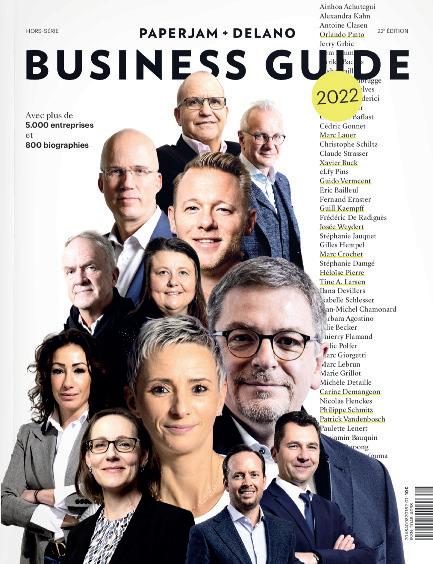
The concerns addressed by the experts we approached for this 2023 Forecast edition indicate that dealing with multiple socioeconomic challenges in a tense geopolitical environment make accurate predictions extremely difficult. However, we managed to pick out five megatrends that will be critical for the grand duchy over the next 12 months.
Respondents emphasise sustainability in all sectors, from transportation to food. Organic food and regional products are expected to remain in high demand. The importance of efficiency and quality in logistics and processes is equally highlighted. Sasha Baillie, head of Luxinnovation, also indicated efforts will match demand in making businesses more sustainable and that data- driven business strategies can play a vital role in this. Delano will also reduce its number of publications and switch to a lighter type of paper, cutting its carbon footprint by more than 30%.
Artificial intelligence is creating new opportuni ties. Laurent Marochini emphasises tokenisation plans, cryptocurrency growth and regulation, Web3 developments, cybersecurity and responsi ble financing. Some experts predict an increase in cyberattacks, while others emphasise the importance of implementing company-wide security measures while also boosting innovation and processes. Here again, a talent shortage in IT specialists could lead to developments that allow non-IT employees to perform automated tasks. And using super-computer Meluxina to create disruptive solutions could be interesting.
Statec's best and worst-case scenarios for 2023 range from an inflation rate of 2.6% to 4.1%, which could trigger one or two wage indexations, in addition to the one delayed from 2022. That means businesses will have to be flexible in their wage structure budgeting, while at the same time dealing with uncertainty in the energy markets and continued fluctua tions in interest rates. 2023, then, is expected to be a real struggle for businesses of all sizes, as these factors eat into already delicate margins that have suffered during two years of the covid pandemic.
Dealing with talent shortages and the race to hire and retain top talents will be critical for businesses in the future, given the skills gap, especially in the financial and technology sec tors. Companies will need to make compelling offers to keep their best players during times of uncertainty. Finding a balance in hybrid work models also remains a priority, given Luxem bourg's dynamic composition of cross-border workers. But to attract talent from abroad, the country also needs to solve its housing problem and, despite the efforts already made, increase the offer of public schooling in English.
The dual election year is set to dominate the domestic headlines in 2023. All major parties, as well as institutions like Asti, are pushing for more voter participation in the local elections among non-Luxembourgers, now that all residents are eligible to register. But they have to make politics relevant by reaching out directly to foreigners. At the national level, voters will be looking for parties that can deliver much-needed tax reform and have the policies in place that can tackle the housing crisis, make businesses sustainable and competitive, while ensuring that living standards do not fall as inflation bites.
No organization is immune to cyber attacks. Deloitte Luxembourg’s threat intelligence and red teaming services simulate real-life attacks using the TIBER-LU framework, so you can eliminate surprises and fortify your cyber posture.

Today’s economic and financial climate is particularly complex. Taking the right decisions to manage your wealth is not something to be left to chance. For 100 years, our experts in Luxembourg have been supporting you in the preservation, growth and transfer of your wealth.